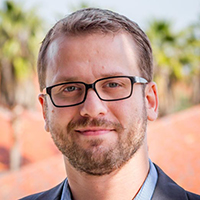Baris Kasikci earns VMWare Early Career Grant
The grant recognizes recently appointed faculty whose research interests and accomplishments seem poised to have significant impact within the industry and academia.

 Enlarge
Enlarge
Baris Kasikci has been awarded a VMWare Early Career Faculty Grant, recognizing “recently appointed faculty whose research interests and accomplishments seem poised to have significant impact within the industry and academia.” The grant carries a $50,000 unrestricted gift in support of his research.
Kasikci’s research develops techniques for building systems that are simultaneously efficient and trustworthy, with a focus on real-world technical and societal impact. Achieving efficiency and trustworthiness requires an innovative combination of approaches. His work draws insights from a broad set of disciplines such as systems, computer architecture, and programming languages, in order to face new challenges.
Kasikci works to tackle the growing complexity of software ecosystems and the hardware used to power them. Software systems are increasingly more complex and consist of deep stacks. Software’s soaring complexity combined with the halt of Moore’s Law and Dennard Scaling is causing a shift to a more heterogeneous hardware landscape, comprising CPUs, GPUs, FPGAs, fast networks, and denser memory technologies.
For the foreseeable future, improving the efficiency of computer systems will be crucial to enabling society’s growing reliance on feature-rich software. One of Kasikci’s recent projects developed a special software manager to accomplish this, called a hypervisor, that was specially designed for these hardware systems with a blend of different computing components. This manager is crucial for cloud settings, where customers frequently vie for the same hardware support and it needs to be smartly allocated.
Unfortunately, Kasikci says, trustworthiness in this complex ecosystem is often an afterthought. This has led to software and hardware plagued with bugs that cause data loss, security vulnerabilities, and failures of critical infrastructure, incurring over $2T of costs in the US alone in 2020. As Kasikci’s lab continues to design more efficient ways to manage complex software, they’ll maintain a focus on ensuring these methods are correct and bug-free.
 MENU
MENU 
